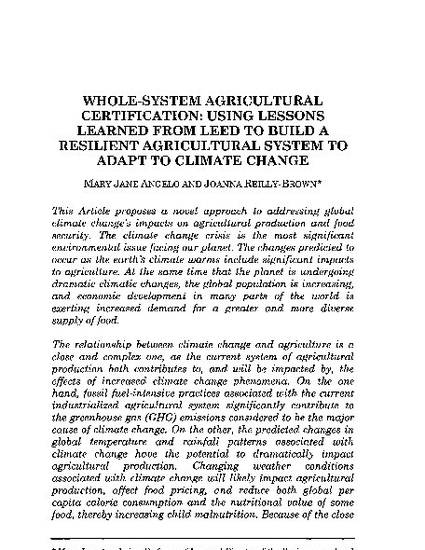
This Article proposes a novel approach to addressing global climate change's impacts on agricultural production and food security. The climate change crisis is the most significant environmental issue facing our planet. The changes predicted to occur as the earth's climate warms include significant impacts to agriculture. At the same time that the planet is undergoing dramatic climatic changes, the global population is increasing, and economic development in many parts of the world is exerting increased demand for a greater and more diverse supply of food.
The relationship between climate change and agriculture is a close and complex one, as the current system of agricultural production both contributes to, and will be impacted by, the effects of increased climate change phenomena. On the one hand, fossil fuel-intensive practices associated with the current industrialized agricultural system significantly contribute to the greenhouse gas (GHG) emissions considered to be the major cause of climate change. On the other, the predicted changes in global temperature and rainfall patterns associated with climate change have the potential to dramatically impact agricultural production. Changing weather conditions associated with climate change will likely impact agricultural production, affect food pricing, and reduce both global per capita calorie consumption and the nutritional value of some food, thereby increasing child malnutrition. Because of the close relationship between climate change and agriculture, climate change has the potential to greatly impact global food security as its effects become more prevalent.
As the impacts of climate change on worldwide food production become more pronounced in the coming decades, it will become increasingly necessary to shift agricultural strategies away from current industrialized practices and toward a more resilient system of “ecologically-based” agriculture. This Article suggests that a key component to developing an agricultural system that can adapt to the likely impacts of climate change involves applying the concept of ecological resilience to increase agriculture's capacity to absorb climate change's impacts. Ecological resilience considers the magnitude of disturbance a system can absorb before the shock causes it to shift into another state. In an agricultural context, this concept describes a farm ecosystem's ability to adapt to shocks or disturbances, such as drought and pest and disease outbreaks, that threaten its ability to continue to function to produce acceptable crop yields.
In this Article, we suggest a new approach that we call “whole-system” agriculture certification, which builds on the successes of eco-labeling and the United States organic certification program by rewarding ecologically-based practices that enhance an agricultural system's resilience in the face of climate change-induced uncertainty. This Article proposes that this whole-system agricultural certification approach be modeled after the successful Leadership in Energy & Environmental Design (LEED) green building certification program, which certifies that buildings and communities are constructed according to specific standards designed to address aspects of environmental sustainability, and demonstrates how such a system would work.
